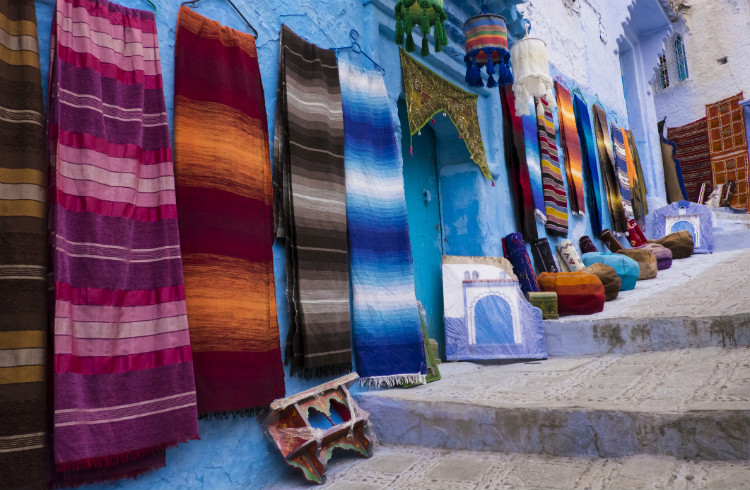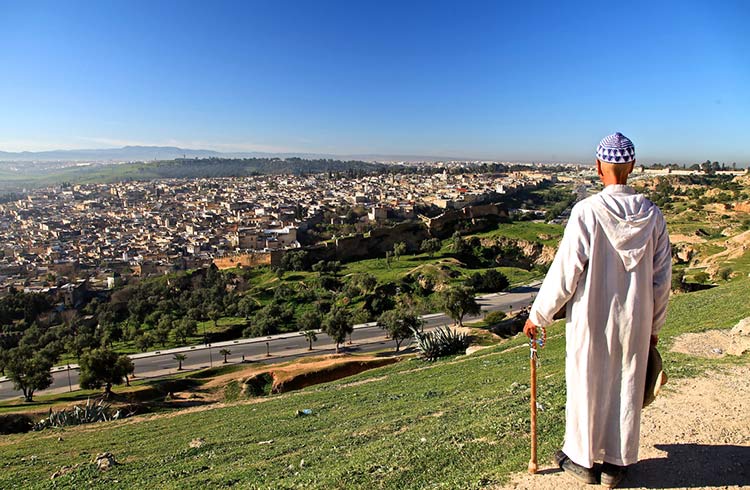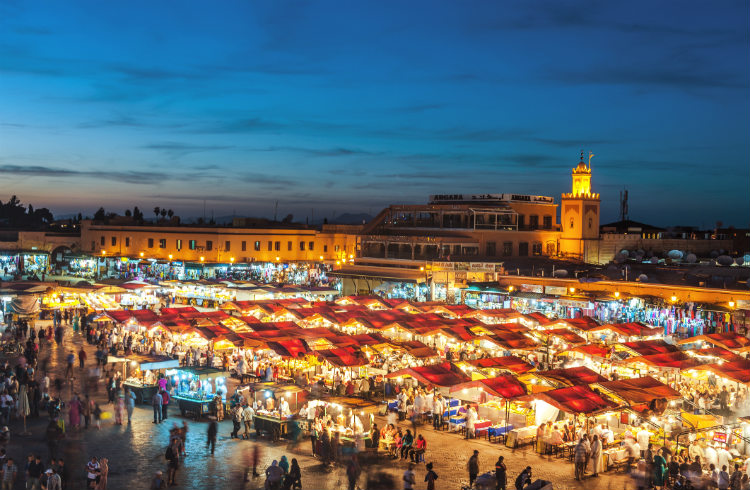6 Common Tourist Scams to Watch Out for in Morocco
Coronavirus (COVID-19) and travel: The situation around the world is changing dramatically. Various governments have changed their travel warnings to restrict travel during this time. To understand how this may impact cover under your policy, please go to our FAQs and select your country of residence.
For the latest travel warnings and alerts around the world, read about lockdowns and border restrictions.
Most Moroccans are friendly and helpful to travelers. However, there's a minority who will take advantage, especially in the medina of Marrakech. From overcharges for henna tattoos to fake fossils and dodgy guides, here's what you should know.
Shares
 Photo © Getty Images/Delia Delimont
Photo © Getty Images/Delia Delimont
Moroccans are famous for their hospitality, and the reputation is well-deserved. In many parts of Morocco, people will go out of your way to help you, treat you to tea or a meal, or host you at their house – or even invite you to a wedding.
Unfortunately, mass tourism has changed that in some places. It has deeply damaged certain communities, such as the medina (or old city) of Marrakech, sending real estate prices upward as older houses are bought to be converted into hotels and guesthouses. Poorer residents have been priced out of their rentals, leaving a hollowed-out neighborhood consisting of hotels and guesthouses, souvenir shops, and restaurants and populated by tourists. The phenomenon has generated resentment, which sometimes leads to vendors and salespeople taking a mercenary attitude towards tourists – now their only source of income.
It’s easy to become self-righteous about scammers. But keep in mind that the minimum wage in Morocco for private sector workers is just $265 USD a month, with many people earning even less. And even Moroccans who can afford to travel will find it extremely difficult to get a visa to visit Europe, the United States, or Australia, whereas an American or European tourist doesn’t need a visa to visit Morocco. That is to say, more than one type of scam is at work in this situation.
- Henna tattoos
- Overpriced taxis
- Surprise charges at meals
- Charges for photos
- Fake guides
- Fake items for sale
- Beyond scams: high prices and the art of bargaining
Henna tattoos
If you're getting a henna tattoo, make it clear what you want, and where you want it. Some henna tattooists have a habit of very quickly extending their design and demanding payment for the extra work.
Even if you haven't asked for a tattoo, don't stand too close to or have your back to a henna tattooist – particularly in Marrakech's Jemaa el-Fna square – or you may find unwanted henna appearing up your arm, and a request for payment.
Some vendors also offer what they say is a free tattoo but will then charge you for it when it's done. If you don’t pay, they will take a cloth and smear the messy henna all over your hand which could end up on your clothes. When looking at their price list, note these are up for negotiation.
Most hotels can arrange a visit from a good henna artist or recommend a place with fair prices and quality henna.
Overpriced taxis
Taxi drivers in Marrakech are notorious, even among Marrakchis, for overcharging. Taxi drivers are obliged by law to use a meter, and there are standardized rates to and from the airport. However, with tourists – and sometimes even with locals – taxi drivers will refuse to the use the meter and demand a set price many times more than the legal fare.
If you take a taxi, ask right away for him to use the meter – or compteur, the French word. If the driver tries to get you to pay a fixed rate instead, or claims the counter is broken, don’t get in the cab. You can also take a picture of the taxi number or license (found on the door and windshield) and say that you’ll report the driver to the police or the central taxi office, a serious threat. Also make sure you have small bills, as some drivers will put on the counter but then claim not to have change.
There are standardized rates to and from the airport, and these are found written right on the taxi stand at the airport. If drivers insist on a higher price – perhaps using the excuse that the sign has not been updated – it might be worth finding an airport police officer to enforce the standardized price.
While some drivers outside of Marrakech also try to take advantage of tourists this way, most are honest. But just in case, always, always insist on using the meter.
Buses in Marrakech – including the airport bus – are easy to use, so they’re a good alternative to fighting over the fare.
Surprise charges at meals
The main square of Jemaa El-Fna in the old city of Marrakech is famous for this trick: you sit down at a table to eat, and the waiters immediately bring you bread, olives, and many small dishes of appetizers. These are not complimentary. Ask the waiters to remove what you don't want and ask the price of everything else. This will save you from the frustration of surprise charges when it’s time to pay the bill.
Charges for photos
Taking photos of snake charmers, dancers, monkey keepers and shopkeepers will often require payment.
Don't take photos of anyone with animals or have a photo taken with an animal. Often, the animals aren't being cared for properly and are being exploited to make money.
Fake guides
There are many professional, government-licensed guides who can provide tours of the medina. But you’re likely to be approached by strangers – especially if you’re seen carrying luggage – who may ask you where you’re going. If you tell them, they’ll try to lead you to the place, but unfortunately, they’re not just being friendly and helpful;. You may or may not get there easily, but you’ll be asked for a fee, sometimes as much as 20 euros for a five-minute walk.
In the medina of Marrakech or other cities, you may also be approached by someone who tells you that there is a special festival going on that day, and that they’ll lead you there, avowing that they’re just doing it because they simply love their city and like showing travelers around. There is no festival; this person will probably lead you to the tannery area of the medina, and to a shop where he’s likely to have been paid a commission to bring you. As with most offers for something free in the medina, it’s best to just say no.
How to avoid unwanted assistants
- If you need directions, go into a shop. The owner can't leave the store, so won't have any interest in leading you astray.
- Ask a family for directions.
- If you find you've inadvertently acquired an ad hoc guide, or you're being harassed by someone who insists on being your guide, ask them to take you to the tourist police. It's illegal to be a guide without a registered license.
- If you really want a guide, get an official one; ask your hotel for contact details.
Fake items for sale
Fossils
Morocco has become a bit of a hot spot for fossils over the years and often travelers will see dinosaur jaws, trilobite, ammonite, and orthoceras fossils being sold in the souks. Some tips to tell if it's fake or not:
- If the stuff on display looks mass-produced (i.e identical), it probably is
- Dinosaur teeth are rarely found in-situ (i.e attached to the jaw)
- If it looks like a franken-trilobite (bits all stuck together), it's fake
- Rare fossils are not going to be cheap
- If it looks perfect, it's probably fake
Designer products
Any supposedly designer or brand-name product found outside of the official brand store is almost certainly fake. Small shops and street vendors will probably tell you up front the product is not “original,” the French word. But this rule even applies to large, reputable-looking shops selling, say, athletic shoes or clothes. Unless you’re buying those Adidas in the official Adidas store, don’t expect them to last for more than a few months.
Argan oil
Morocco is known for its argan trees, and the oil pressed from the nuts is prized for its culinary and cosmetic properties, but sometimes what is sold as pure argan is actually vegetable oil mixed with a little argan (to give it the right aroma), and some turmeric to give it more color.
Argan has a very distinctive, rich, nutty taste, so the best way to test a bottle is to taste it. However, some vendors even fill a bottle with vegetable oil and top it off with argan in order to pass this test.
Argan sold at roadside stands, by itinerant sellers, and outside of shops is unlikely to be real. Unfortunately, extreme poverty in the Moroccan countryside has driven people to such desperate measures. But even in medinas, be wary. Some shops have a machine that presses the oil from argan nuts in front of you. If they fill a bottle this way, it’s probably safe, but the other, sealed bottles in the store might be watered down. Cosmetic argan sold at stands in the street is probably vegetable oil with a drop of argan to give it a nice smell.
In general, it’s best to buy argan products from cooperatives, groups of primary producers who share the costs of processing and selling argan nuts. But even cooperatives can be faked—sometimes it’s just an individual calling themselves a cooperative in order to ride on the good reputation such organizations enjoy. So do your research: many cooperatives now have websites, so find one with a good reputation and get in contact when you arrive.
Beyond scams: high prices and the art of bargaining
It’s not a scam, but tourists are sometimes shocked by the high prices asked by vendors in touristic medinas. Bargaining is part of Moroccan tradition, but on top of this, the local economy’s dependence on tourism has strongly motivated vendors to get as much as they can out of every transaction. This is less prevalent in the medinas of smaller cities. Another option is to find cooperatives of craftspeople, so that you don’t end up paying the middleman’s cut, which can be hefty.
If you’re interested in buying something in the medina, whether it’s a small trinket or a more valuable item, get ready to bargain. The seller’s goal price is not based on the value of the item, but rather on how much he or she thinks the buyer is able to pay. Since a European or American tourist might easily earn ten times the Moroccan minimum wage, it’s not surprising that, in touristic medinas like Fes but especially Marrakech, starting prices can be vastly inflated.
Before you begin bargaining, take a close look at the item and come up with a number. Then ask the item’s price at several different shops – while this won’t give you any idea of the item’s actual value on local markets, it will help you rule out the most expensive vendors. Then, when you start bargaining, stick with the price you have in mind; don’t be perturbed if it’s half or even less of the asking price. If you walk away, some shopkeepers will use anger as a tactic to pressure you to buy. Other tactics include acting insulted by an offer, telling you the price they supposedly paid for the item, and guaranteeing the quality of the item. But sticking close to the price you have in mind is the best way to avoid buyer’s remorse.
When it comes to bargaining, it’s often about finding the right seller whose ideal price is somewhere near yours. Above all, stay good-humored; bargaining isn’t intended to be a battle, but rather a relationship. Make small talk and become interested in the person you're interacting with. In Morocco, there is no such thing as a mere financial transaction; money doesn’t give you the right to overlook the human being behind the product. Instead, commerce is a creative act involving two people and the chemistry between them. If you’re not feeling the chemistry with the seller, thank him or her for the time, say goodbye, and keep looking
In the end, attitude is everything. When you enter a medina, you’re entering a city with hundreds of years of history that’s experiencing disruptive and often negative change caused by the very activity you're participating in. Maintain firm boundaries with those who might want to take advantage of your ignorance, but also be aware of that ignorance, and act like a respectful guest. If you treat each interaction – even buying a souvenir, or eating dinner – as a small relationship with someone as fully human as you are, then you’ll really be experiencing something authentically Moroccan.
Get a travel insurance quote for Morocco
You can buy at home or while traveling, and claim online from anywhere in the world. With 150+ adventure activities covered and 24/7 emergency assistance.
Related articles
Simple and flexible travel insurance
You can buy at home or while traveling, and claim online from anywhere in the world. With 150+ adventure activities covered and 24/7 emergency assistance.
Get a quote

1 Comment
Can you send us information about Morocco Countryside tours? We are about to book with them and want to make sure they are legitimate